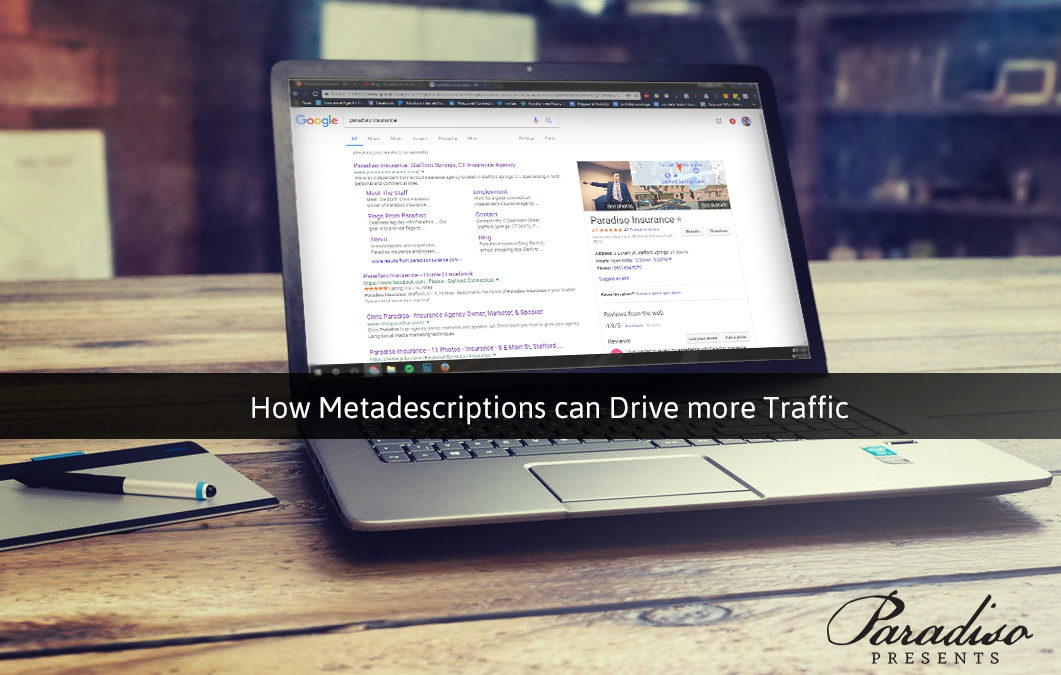If you’re looking to boost your agency’s traffic and leads, search engine marketing is essential.
Consumers are turning to search engines to guide their insurance shopping process. According to the J.D. Power 2016 U.S. Insurance Shopping Study, 74 percent of consumers use websites or aggregators for quotes and information.
These searchers represent targeted leads-in-waiting. You don’t have to pay to get your insurance agency website in front of them during their moment of need.
But, it does take a lot of hard work and strategic thinking to maintain a strong presence in search results. Google alone looks at more than 200 factors when ranking websites on their results pages. Your agency must pass these quality checks to show up in results for relevant searches.
Still, there’s one factor Google doesn’t look at that you should work on: your meta descriptions. Here’s why this element can make or break your search marketing strategy.
What is a Meta Description?
A meta description is a short snippet of description text in a search listing. It shows up under the website link and provides more information on the webpage the link goes to.
For example, the highlighted section below is the meta description for Paradiso Presents:
Websites house meta descriptions within in the HTML source code of each page. You can’t see these descriptions when you visit these pages. Search engines use the descriptions in their results.
In most cases, the meta description will appear in search results verbatim. Still, there are some cases where search engines will use other content from the page instead. These situations include the following:
If no meta description exists for a page.
If the search engine considers the meta description to be misleading or irrelevant.
Don’t want your meta descriptions to be rewritten? Focus on writing relevant descriptions across all the pages of your website.
This project can help you control how your website appears in search engine results. But, that’s only the tip of the iceberg.
There’s much more you can, and should, do with this website element.
Why Meta Descriptions Matter
Google has confirmed they don’t look at meta descriptions for ranking purposes. But, you can bet that consumers are paying attention to them.
What does this mean for your agency’s website? On one hand, outstanding meta descriptions might not lead to higher rankings. On the other, they can boost traffic on the listings that already exist.
How? Search engines display up to 10 different listings on their first page of results. The first listing does generate the most attention. But, many people will look at several listings before choosing which one to click on.
The meta descriptions for these search results factor into a person’s decision. They can help provide context on the webpages in the results. And, they can assure people that your web page is the most relevant solution for their needs.
If you have well-written meta descriptions, specific rankings won’t matter as much. As long as your website is on the first page, you’ll still get plenty of clicks.
How to Craft Outstanding Meta Descriptions
Writing a top-notch meta description can be trickier than it seems. You have limited space, but you need to make a big impact.
Here are five tips to get you started.
Keep them under 156 characters. Google will only display the first 156 characters of a meta description. Other search engines have a similar character limit. Anything beyond this number gets cut off with an ellipsis (…). Keep in mind that punctuation and spaces count toward that character limit. So, be careful when choosing your words.
Think benefits, not features. Searchers use a combination of logic and emotion when choosing which listing to click on. Lay out the benefits your page provides. Benefits can speak to logic and emotion and earn you the click.
Be conversational. Consumers have questions or concerns they need answered in short order. Stuffy or jargon-filled meta descriptions will scare them away. Write in natural language to build rapport and trust.
Don’t worry about keywords. As mentioned earlier, Google doesn’t use meta descriptions as a ranking factor. So, focus on writing a description that entices people to click. Don’t sweat it if that description doesn’t include the keywords you’re targeting.
Include calls to action. Sure, you want to earn the click. But, don’t stop there! Encourage people to call your office or fill out an online contact form. A little nudge can go a long way.
You don’t need to use all five of these tips on each meta description. For example, a description for a blog post doesn’t need a call to action in it. Still, it’s a good idea to think of these tips as guidelines when you’re putting new meta descriptions together.
Finally, think of the following questions when implementing a meta description strategy:
What are people looking for?
How can I convince them that my agency’s website is the only answer they need?
Knock these answers out of the park, and you’ve aced the first impression. And, that means you’re one step closer to gaining a new client.
For more online marketing content from ITC’s experts, visit www.GetITC.com.






Great advice and help when doing a posting or blog. Thanks.
Your very welcome Tom Larson!!!!Thanks for your friendship